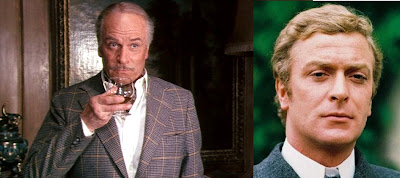The best thing about this film is its title. "Crouching Tiger, Hidden Dragon" has become a household name and the inspiration for a thousand punning headlines. It has the ambiguity and resonance of a good song lyric.
WARNING: CONTAINS SPOILERS
Follow @MichaelHardach
I liked the title but I didn't like the film very much. Two hours of po-faced magic realism was too much for me. The danger of magic realism is that is that it ruins all suspense and makes every situation unbelievable. Who cares about a fight when the loser can simply fly away to escape the beating? Who cares about a warrior when thanks to magic he is basically invincible?
Successful examples of magic realism get around these problems. Jon Favreau's Iron Man for example, has characters with magic powers but it derives humour from the characters using those powers to act like tools and generally express their human frailties through their superpowers.
Angela Carter's novel Nights at the Circus has characters with magic powers but takes a joyful relish in the freedoms this gives them, making its gender politics points with supercharged gusto.
Review continues below...
Inspire your baby with the Visual Baby series of picture ebooks. Original patterns and art designed for young eyes. Try them today by clicking the covers below.
"It's the only thing that stops her crying" Katie Alison
"All three of my children love this book" Janice Peterson
"Moons, trees, leaves... fabulous!" Linda Matson
Both Iron Man and Nights at the Circus aren't afraid to make the viewer / reader laugh. The joy and exuberance of the magic spills over into the joy of the characters.
Crouching Tiger, Hidden Dragon on the other hand doesn't have a single laugh in it from beginning to end. Its magic serves no purpose except to deflate tension.
True there are some stunning landscape shots. True, the three female leads all have mighty screen presence. True, the courtship scene between Jen Yu (Ziyi Zhang) and Lo 'Dark Cloud' (Chen Chang) has its romantic moments. I particularly liked the scene where he finds enough scarce desert water to give her a bath, which he heats with fire rocks. It's a writer's job to create a really memorable and romantic courtship scene in a love story, but in many films it's a missed opportunity.
But it's not enough. If the women are strong, the men are weak. In particular, Li Mu Bai (Yun-Fat Chow) has all the charisma of a used (green) teabag. And I didn't believe in any part of the story. I didn't believe in Li's sad meditation experience. I didn't believe in Li's decision to give away his sword (seemingly only to allow it to be stolen). I didn't believe in Li and Yu Shu Lien (Michelle Yeoh)'s decision to not become lovers. I didn't believe in Jen's precocious fighting powers. I didn't believe in Jen's abduction by Dark Cloud or her subsequent relationship with him.
The presence of magic lets you do almost anything but it doesn't relieve you of the requirement to make your story and characters believable if you want to engage the viewer.
Personal Score: 3/10
Follow @MichaelHardach
This is part of a series of film reviews where I give my comments on IMDB Top 250 films as a writer. The idea is that over time these posts will build into a wide-ranging writing resource.
For more details about the approach I've taken, including some important points about its strengths and weaknesses (I make no claims about my abilities as a film critic or even the accuracy of my comments... but I do stand by the value of a writer's notes on interesting films), see my introductory post here.







